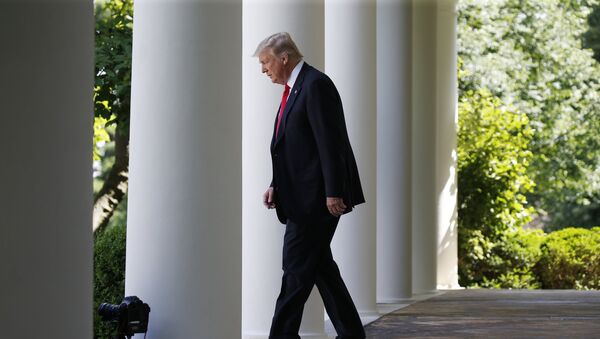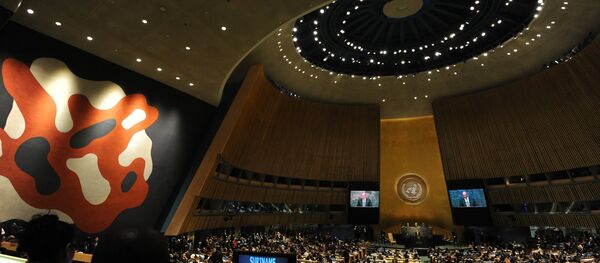MOSCOW (Sputnik) — The US business community and local authorities are intent on investing in renewable energy amid the government's apparently mixed signals regarding participation in the Paris agreement on climate change, experts from environmental non-governmental organizations told Sputnik.
The Paris agreement, which has so far been ratified by 162 signatories out of the total of 197, entered into force on November 4, 2016. The agreement serves to outline the participants' ambitions and plans for reducing emissions, known as Nationally Determined Contributions (NDCs). The agreement sets the goal to keep the increase in average global temperature at below 2 degrees Celsius (3.6 degrees Fahrenheit) and urges wealthier nations to provide help to poorer ones. NDCs are not legally binding. On June 1, US President Donald Trump announced the United States’ withdrawal from the Paris accord.
On Saturday, White House Press Secretary Sarah Sanders refuted media reports that the government's position on the climate deal had changed.
Our position on the Paris agreement has not changed. @POTUS has been clear, US withdrawing unless we get pro-America terms.
— Sarah Sanders (@PressSec) September 16, 2017
Sanders' refutation came after European Union climate commissioner Miguel Arias Canete reportedly said that the United States would "try to work on how to re-engage," following a meeting of the 30 signatories of the Paris deal, held in Canada's Montreal.
Country Remains Committed
Andrew Deutz, the director of international government relations for Nature Conservancy, told Sputnik that the private sector had responded strongly to Trump's decision to withdraw from the Paris climate agreement.
"We saw a very strong and pro-active response from the private sector when the Trump administration was considering pulling out from Paris. Many companies from different sectors of the economy all lined up to say, "We believe in climate [change], we believe in these initiatives. We want the US to stay in. That will help drive our businesses forward," Deutz said.
Over 2,300 leaders of various US organizations from across the country, representing more than 127 million US citizens, have signed the initiative called "We Are Still In" that coordinates efforts to fight against climate change. The participants have declared they will continue to support climate action to meet the requirements set out in the Paris accord.
In August, states participating in the Regional Greenhouse Gas Initiative (RGGI) announced they would aim to reduce greenhouse gas emissions from power plants by an additional 30 percent by 2030.
Erika Rosenthal, the staff attorney with the Earth Justice international program, told Sputnik said that she expected these kinds of actions to continue.
"Cities, states, communities and businesses across the US are doubling down on emissions reductions. They are moving ahead full steam with the transition to renewable energy, implementing energy efficiency. We saw an extraordinary level of commitment, very vocal, very public – from mayors, governors and businesses across the nation and this will continue. We all understand that the Paris agreement is fundamental for our future," Rosenthal explained.
Economic Disadvantage
"Not only the Paris agreement on the global cooperation is key to avoiding climate catastrophe, but it also grows the global market for US clean energy exports, creates clean energy jobs. For the president, who prides himself on recognizing a good deal, it is sad that he fails to recognize how the Paris agreement is beneficial to the world and to the US," Rosenthal said.
According to the 2016 report by the US Department of Energy (DOE) over 3.3 million US citizens were employed in the clean energy sector. The same report by the DOE estimated that the fossil fuel industry employed around three million people.
"The smart thing for economic growth and jobs, for competitiveness and innovation, and for better health, is to invest in the low-carbon future. Solar energy jobs would grow at 12 times the national average of job growth in the US, so the smart thing to do would be to invest in renewable energy technologies and not try to protect fossil fuel industries that are being out-competed in the marketplace," Deutz said.
Divisions Within Administration
On Sunday, Secretary of State Rex Tillerson told CBS broadcaster that Trump "is open to finding those conditions where we can remain engaged with others on what we all agree is still a challenging issue."
Deutz told Sputnik that the administration’s vague and often inconsistent stance on the Paris accord is a sign of internal division on the issue.
"There was always a battle within the Trump administration about what the nature of the announcement [was] … there was one camp in the administration that said that the US should withdraw completely from Paris. And the second camp that said that the US should re-negotiate its national commitments to stay within the agreement," Deutz explained.
"Those people within the US administration who wanted to stay in Paris with a weaker target are still in the administration, so it is possible that the US may come forward with a weaker emissions reduction target for 2025 as a way to stay engaged in the Paris agreement rule making process," Deutz said.
According to the expert, this might lead to other countries feeling less pressure to increase their commitments.
French President Emmanuel Macron said during a speech at the UN General Assembly on Tuesday that the agreement was not up for negotiation. Macron said also that he respected Washington's decision to withdraw and that the United States was welcome to return.




